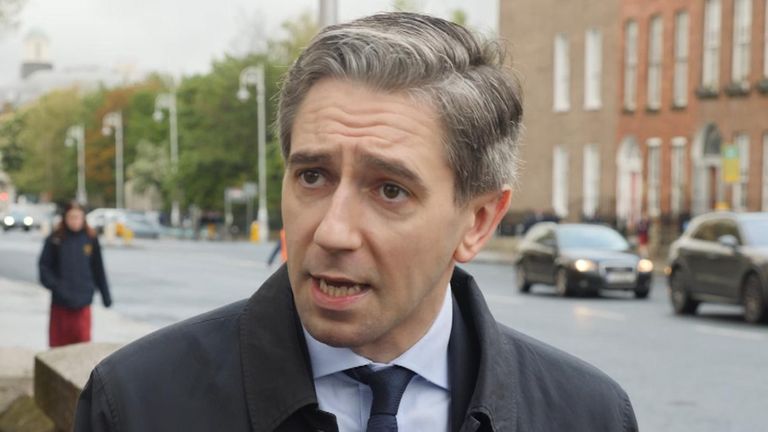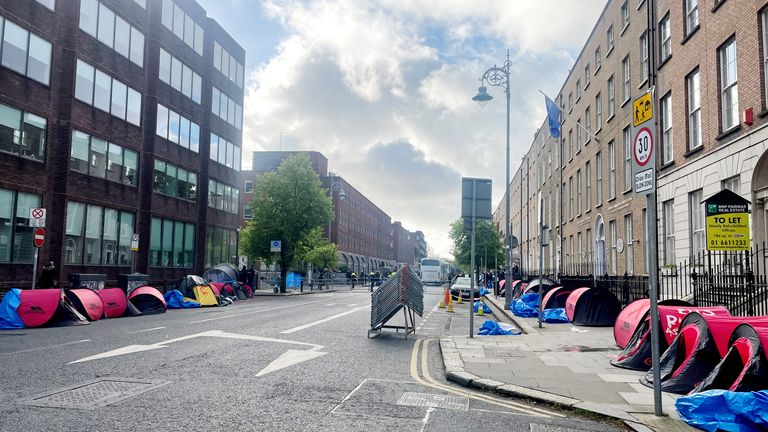Blame the Brits. An unsanitary encampment of hundreds of tents sprang up in the heart of Dublin outside the International Protection Office where homeless immigrants can apply for asylum.
Irish ministers pointed the finger at Rishi Sunak‘s Rwanda removal policy.
The new taoiseach, Simon Harris, declared: “This country will not in any way, shape or form provide a loophole for anybody else’s migration challenges.”
His deputy, and former prime minister in the coalition government, Micheal Martin claimed it was “fairly obvious” that “fearful” immigrants were hoping “to get sanctuary here and within the European Union, as opposed to the potential of being deported to Rwanda”.
Justice minister Helen McEntee briefed that up to 91% of those making applications were now coming in “across the border” – the open border on the island between Northern Ireland in the UK, and EU member state, the Republic of Ireland.
Her scheduled meeting with the British Foreign Secretary James Cleverly was cancelled.
This spat has put Anglo-Irish relations back into the deep freeze and re-ignited arguments about the post-Brexit North-South border.
If anything, the stand-off should draw attention to the similar predicaments in which both Dublin and Westminster find themselves, as they struggle to deal with the electorally super-sensitive issue of growing illegal migration into Western Europe.
Both governments’ actions are shot through with contradictions and muddled thinking.
For example, both are resorting to their parliaments in a bid to overrule their high courts’ legal rulings that the next intended destination for deportees is “not safe”.
That is Rwanda for the British government, and the UK for the Irish, in part because of the possibility of onward transfer to Rwanda.
Politics latest
Ireland and the UK are both in pre-election periods. The UK is already digesting weathervane local elections while Ireland will hold European and local elections next month.
Hasty remarks to score short-term political points are threatening to do damage more broadly in the long term.
Speaking to Sky News last week, the prime minister was eager to promote the Safety of Rwanda Act, which had just battled through parliament to royal assent.
In the process, he gave credence to the Irish allegations.
He assured Trevor Philips that other nations are following the UK and talking about “third country partnerships” to “solve” the global challenge of illegal migration.
He added: “What it also shows, I think, is that the deterrent is, according to your comment, already having an impact because people are worried about coming here… that’s why the Rwanda scheme is so important.”
The prime minister’s remarks were seized on by the Irish media along with a satirical commentary on GB News by Jacob Rees-Mogg, little noticed in Britain, which gloatingly suggested that the solution to the problem was to accommodate the UK’s asylum seekers in a disused army barracks on the Irish border.
Extreme Northern Irish Unionist voices crowed that the British and Irish governments had only themselves to blame for bending over backwards to keep the border open – a key element of Sunak’s Windsor Framework and the original Belfast Agreement.
Jim McAllister MLA, the leader of Traditional Ulster Voice, said Dublin was “reaping what it had sowed”. Nigel Dodds, Kate Hoey and Lord David Frost concurred that the Rwanda effect is impacting on Ireland.
By the end of this week, the Irish government had removed the tent city. Mount Street was sprayed with disinfectant and street furniture will be placed so it cannot spring up again.
Over a hundred tents were taken down and 285 men – they were all men – were offered safe accommodation and bussed to temporary official accommodation, some of it bigger tents, on the outskirts of Dublin in Crooksling and Citywest.
Around 30 of them chose to move off to sleep rough elsewhere. A similar number were bussed back to the city centre after their new accommodation was available for one night only.
The immediate and highly visible crisis of the sprouting shanty town may have been removed but for both the Irish and British governments the challenges raised by increasing illegal migration are greater than ever.
The Mount Street occupants were only ever a small fraction compared to the 1,400 or so asylum seekers being recorded in Ireland each month.
There are claims the country is on course to take in a record 20,000 this year.
A few of the handful of campers interviewed by the media mentioned Rwanda, but most did not. It is far too soon to say whether the Rwanda policy is acting as a deterrent.
Last Wednesday, there were 711 small boat arrivals in the UK, the highest daily total so far this year. Crossings are being made at a higher rate than in 2023. No one has yet been sent to Rwanda involuntarily.
Irish ministers quickly admitted that their allegations about the spike in border crossings were not, and could not be, “data-based”.
The evidence is circumstantial. There has been an increase in people applying at the HQ in Dublin rather than at ports and airports.
👉 Tap here to follow Electoral Dysfunction wherever you get your podcasts 👈
Ireland is not in the EU’s Schengen freedom of movement area, so the argument went, if migrants were not picked up at other points of entry they must have come across from the North.
Ireland is tightening its regulations on all immigrants. Some of those contributing to the increase in registrations may already have been in the country.
Both countries have lost track of their asylum seekers and neither operates an identity card regime.
Many of Ireland’s applicants may have always intended to end up there rather than in the UK.
In Ireland in 2023, there were 26 applications per 100,000 people.
That proportion is about average for the EU, and significantly greater than the UK with 10 per 100,000. Rishi Sunak pointed out that the UK cannot return migrants who passed through France, and assured in Prime Minister’s Questions that the “UK has no legal obligation to accept returns of illegal migrants from Ireland”.
Read more:
Anti-immigrant camp in Dublin ‘not about racism’, residents say
Sunak staking premiership on Rwanda flights plan
The Irish government is attempting emergency legislation for returns.
But following Brexit, the UK and Ireland have not put into operation a bilateral version of the EU’s Dublin III Regulation permitting returns to the first safe country of entry.
Since Irish independence, there has been a longstanding Common Travel Area in the UK and Ireland.
Police forces from the two countries are currently working together in the same operation – called Sonnet in Ireland and Gulf by the UK – to stop illegal immigrants travelling within it.
That is very different from removing people from one side of an invisible border and dumping them on the other.
There are allegations that police boarding buses are using racial profiling to identify suspects. Around a third of recent applicants in Ireland are reported to be from Nigeria.
Ireland has enjoyed its reputation as the land of “a hundred thousand welcomes” while several of its leading columnists refer to the UK under the Conservative party as a “rogue state”.
The mood is changing. There is a housing shortage and cost of living crisis exacerbated by perceived demands from new arrivals. The government is proposing cutbacks in the hospitality it is giving to refugees from Ukraine.
There have recently been several violent anti-immigrant demonstrations.
Ms McEntee is coming under attack from both directions – as too tough and too weak – as she tries to get the EU’s proposed European Migration and Asylum Pact approved by the Dail.
Pro-immigration Sinn Fein, currently the main opposition force, is also suffering from a modest drop in support.
Tit-for-tat tough talk between politicians in Ireland and the UK was an obvious, and perhaps inevitable reaction, to difficult circumstances.
It will do nothing to address the issues raised by tens of thousands of people from Africa and the Middle East wanting to come to our countries.
But it threatens to make things far worse for the immigrants and for everyone else on these islands.



